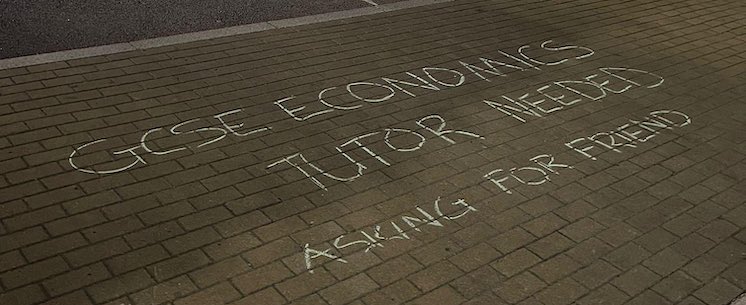
I moved to the UK in 2017, the year after the Brexit vote, in time to have a front-row seat to the ongoing destruction of the economy by the government. In more recent times, leading up to the cataclysmic policy announcements last week that lead to the bond and currency markets downgrading the UK radically, I have been talking about the government being “economically illiterate”.
Today I’m taking the daily post to give two examples, one this tweet, and yes, even a 16-year-old GCSE economics student could tear holes in the recent policy announcement, they are “quasi-economics” at best, “Kami-Kwasi” economics the more popularly used phrase since last week. The second example is a long read by Umair Haque, which is depressingly accurate and pinpoints how the UK got to this parlous state and how it will now get even worse.
Genius.
For folk outside the U.K., GCSE exams are sat at aged 16, and yes, anyone who learns enough to pass that exam is asking “what on earth is this “Kwasi-nomics”?
Fair enough as it is Economic policy in name only, it is economically illiterate. https://t.co/iHDy9XGSAW
— Tom McCallum (@TomCayman) September 27, 2022
Succinct, but now in more depth, a link to Umair’s article and a few snippets:
What Britain’s Kamikaze Self-Destruction Teaches the World
How Britain Became the World’s Newest Banana Republic
The intro:
Something remarkable happened yesterday. At which history won’t know whether to laugh or cry. Perhaps it’ll do both. Britain, continuing on its course of self-destruction, finally reverted to back to a developing country. And therein lies a profound lesson for the world — one beset by the temptations of nationalism, fascism, fanaticism. Want to go backwards? Be careful. You might get what you wish for.
Let me tell you the story. Now, it’s going to involve a little economics — but everyone needs to understand how economics really works, so I’m going to teach you a little bit of it. Don’t worry, it won’t be anything you can’t handle.
Shortly after the Queen’s sad passing, a new government in Britain took power. Leading it was a coalition of the most fanatically right-wing figures a modern country has ever seen — to the right of most American Republicans, when it comes to issues of economics and society.
The new Chanceller of the Exchequer — think of him as the Treasury Secretary — announced a new budget. And reacting in shock, laughing with disbelief, the markets proceeded to sell off pounds, at an astonishing rate. By the end of the day, the pound had been shredded. It was trading at its lowest levels since 1985. Those were the days, by the way, of Thatcher. I know — so far, so boring, but bear with me.
What really happened here? Something unprecedented in the modern history of rich nations. The guy running the economy had triggered a currency crisis. This is the kind of thing that we see in “emerging markets,” aka developing countries, poor ones. Some crackpot takes control of the economy, the markets get spooked, and bang — there’s a run on that currency. Everyone wants to flee from it, because the crackpot now running the economy is going to torch it.
I’ll skip over the excellent and very readable economic and political reasons for why the UK has got to where it is now (in a Dickensian past, with social contracts broken and massive and widening divides between rich and poor, all “achieved” in under 20 years of terrible decision-making), and take you to where it is now and where it is going. One word, Freeports:
The current government’s only real plan is something called “freeports.” They’re like putting little slices of China inside Britain — places where democracy and the rule of law literally don’t apply, and corporations effectively run everything, from housing to courts. Dystopian enough for you?
Then consider this: “freeports” are an American idea. They come from an American economist who was Milton Friedman’s best student — remember him? He was the guy that thought there should be “free markets” for everything. Yet even Friedman thought government should provide schools and courts. His student — Romer — went beyond that, and had this bizarre, dystopian idea of “charter cities,” which are places that sit outside democracy, where the highest bidder effectively assumes control of the city as a political entity. So anything goes, from child labour to tax evasion to money laundering — which is precisely why studies have found that in fact, anyone’s who’s tried this idea has just created havens for things like money laundering and organized crime.
This is crackpot thinking. It’s crackpot economics. This idea is so extreme that even America’s never tried, laughed it off, because it’s over the line even for most American Republicans. But now this is Britain’s only plan — its whole plan — for its future.
So, not just Kwasi-economics, but crackpot economics.
Is there a way out of this? Absolutely, even though it will take years. The first step, though, is to understand how the UK has got to where it is now, so I hope you do read Umair’s article and that this stimulates you to read further on it.
Also, if you are really into this, come to Kilkenomics Nov 3-6 in Ireland, and listen to around fifty of the world’s top thinkers discuss this and other pressing issues.
